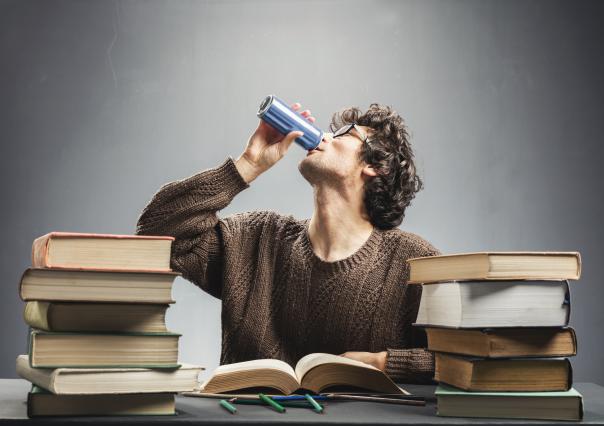
The more energy drinks consumed the fewer hours of nightly sleep participants clocked up, but even just the occasional can is linked to heightened risk of disturbed sleep.
Energy drinks contain an average caffeine content of 150mg per litre as well as sugar, vitamins, minerals and amino acids in varying quantities. They are popular with college students and young people as they offer mental and physical ‘pick-me-ups’.
Researchers drew on 53,266 18 to 35-year-old participants of the Students’ Health and Well-being Study (SHOT22 study).
The students were asked how often they drank energy drinks, with the options including daily, weekly (once, two to three times, or four to six times), monthly (one to three times) and seldom/never.
They were then questioned about their sleep patterns: when they went to bed and got up, how long it took them to fall asleep (sleep latency) and wakefulness after going to sleep. Sleep efficiency was calculated from the total hours of sleep versus the time spent in bed.
Insomnia was defined as ‘experiencing difficulties falling and staying asleep and waking early on at least three nights of the week, plus daytime sleepiness and tiredness for at least three days of the week for at least three months’.
The survey responses found women were more likely than men to report never or seldom consuming energy drinks (50% vs 40%). According to the research, 5.5% of women said they drank energy drinks four to six times a week and just over 3% reported daily consumption. The comparable figures for men were 8% and 5%, respectively.
There was a clear dose-response association for both sexes between energy drink consumption and fewer hours of sleep.
Both men and women who reported daily consumption slept around half an hour less than those reporting only occasional or no consumption. Similar associations were also observed for waking after falling asleep and taking longer to fall asleep.
Insomnia was also more common among both women and men reporting daily consumption than among those reporting occasional or no consumption: 51% vs 33% (women) and 37% vs 22 % (men).
Men who reported daily consumption were more than twice as likely to say they slept fewer than six hours a night, while women were 87% more likely to do so. Those reporting having an energy drink just one to three times a month were still at heightened risk of sleep problems.
The researchers concluded: “The results from the current study show that there is a robust association between the frequency of [energy drink] consumption and the different sleep parameters. Identifying modifiable risk factors for sleep problems among college and university students is vital and our results suggest that the frequency of… consumption could be a possible target for interventions.”
This is an observational study, and as such, no firm conclusions can be drawn about cause. The researchers acknowledged energy drink consumption might be a consequence of poor sleep rather than the other way round. The study relied on self-assessment rather than objective measures of consumption and sleep patterns.